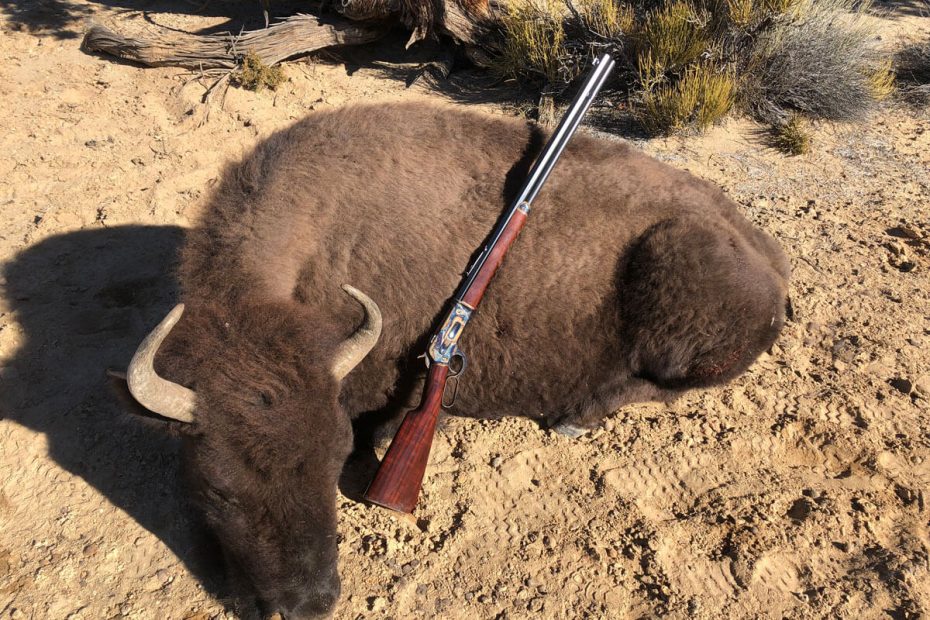
The muffled beat of our horse’s hooves on frozen sand sounded steadily into the crisp desert air; air still frosty with dawn’s coming. Buffalo tracks lay on the ground before us, fresh in leftover snow where the afternoon sun doesn’t reach its fingers. We were hunting the buffalo, following their trail in a once-in-a-lifetime effort to put bison meat in the freezer and a buffalo robe on the floor. My buddy Dan had drawn a cow bison tag for Utah’s legendary Henry Mountains. It was mid-December, we’d found buff after three days of hunting, and our lust to close with the herd was palpable on the air. We followed the tracks, Dan riding loose in the saddle with his buffalo rifle in hand.

BUFFALO RIFLE
Dan opted to hunt his buffalo with a lever-action Winchester 1886 chambered in 45-70; one of the most influential repeating rifles in early American history. It was the first lever-action repeater strong enough to be chambered for the big bore “buffalo” cartridges of the day. Designed by John Moses Browning and produced by Winchester from 1886 to 1935, the rifles were originally chambered in .45-70 Springfield and .45-90 WCF, among others. Black Powder was the standard propellant of the day, but the ’86 action was so strong that it made the transition to smokeless powder with ease, being chambered for the smokeless powder .33 WCF cartridge just after the turn of the century. The largest round it was originally chambered in was, to my knowledge, the massive .50-110 Winchester. Rifles were produced in a variety of configurations and with barrel lengths ranging from twenty to twenty-eight inches.
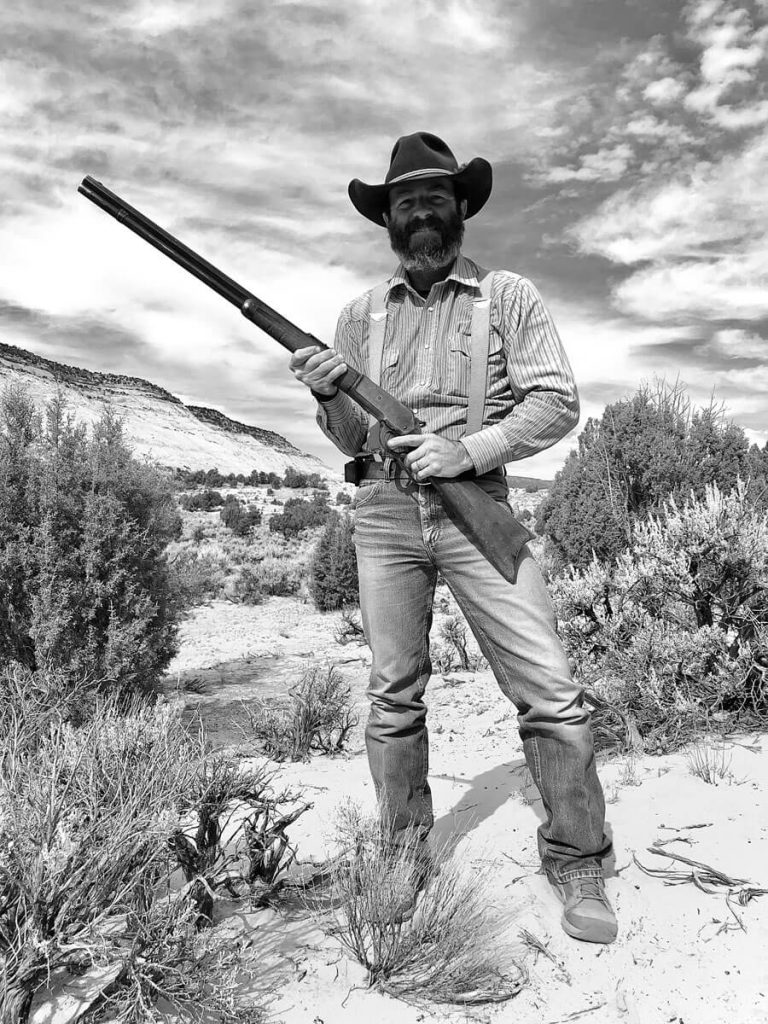
Today, original Winchester ’86 rifles are hard to find and very expensive, especially if they are in even reasonably good condition. If you’re fortunate enough to find an original, the old rifle may be aged or worn to the point that it’s not functional, but taking it to a regular gunsmith for renovation will significantly decrease its value. But if you’re anything like me you love shooting and using vintage firearms, and owning one that is non-functional is, well, just not much fun. Enter Doug Turnbull.

Doug grew up and worked in the Creek Side Gun Shop; the largest firearm shop in upstate New York at the time. In 1983 Turnbull started a firearms restoration business, focusing on matching and restoring original finishes on vintage firearms – particularly color-casehardening. Today he is known as one of the finest restoration artists in North America, and perhaps the only one who can actually make your vintage lever-gun more valuable. Typically, when a vintage firearm is refinished it looses much of its value. Not so when worked on by Turnbull Restoration.

For those of us not fortunate enough to own a vintage Winchester rifle, Turnbull also offers contemporary lever-action rifles that have been “Turnbull Finished”. Essentially, they take recent production rifles, polish the metal to match the work of the late 1800s, and then refinish everything with Turnbull’s legendary bone charcoal color casehardening, bluing, and vintage-type wood finish. Dan’s buffalo gun was one of these. It sports simple but nicely grained walnut, a 26-inch blued barrel, shotgun butt plate, and spectacular color casehardening over most of the metalwork.
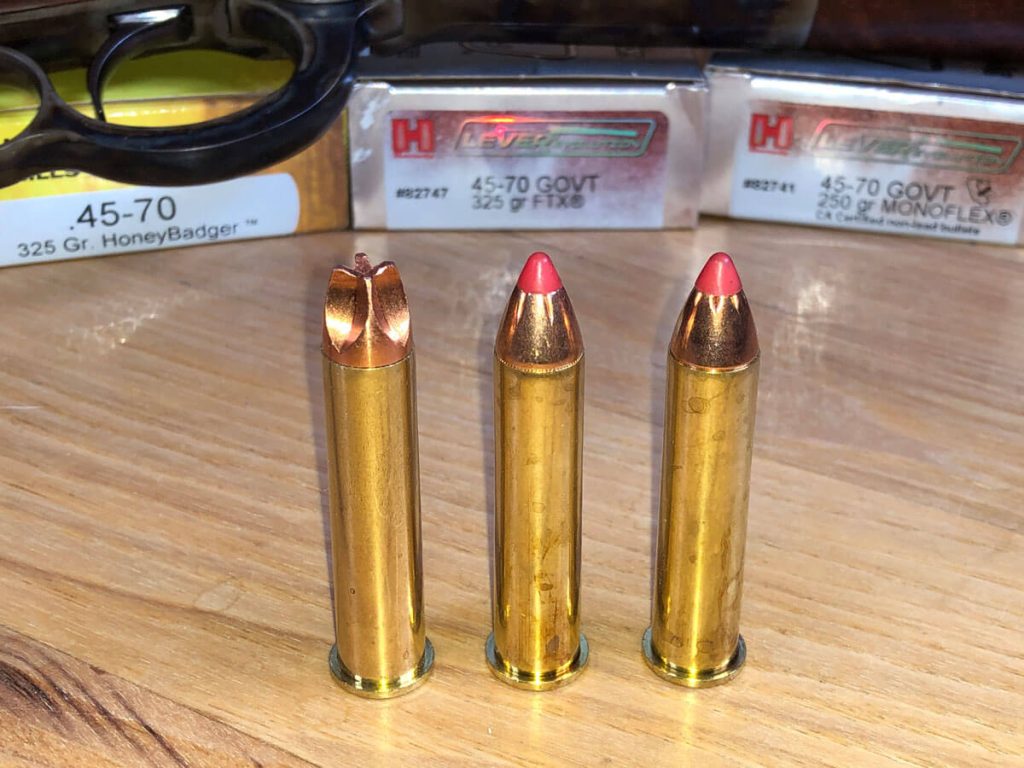
Dan ordered his rifle chambered in .45-70 Springfield, mainly because a wide variety of ammunition is readily available in that caliber. Buffalo hunting on the Henry Mountains is notoriously tough, so we opted to forego traditional ammunition in favor of a load that would offer a bit more velocity and reach when used with the rifle’s simple iron barrel sights. I ordered some of Hornady’s excellent LEVERevolution ammo in 250-grain MonoFlex and 325-grain FTX iterations, and also some Black Hills ammo stoked with their 325-grain solid copper fluted-point HoneyBadger projectiles. I didn’t keep records of accuracy averages and velocities during testing, so you’ll have to take my word for it; each of these loads shot consistently and grouped well.

All three loads grouped high though, in fact, the 250-grain MonoFlex load (the fastest of the three) grouped almost eleven inches high at 100 yards. I didn’t want to remove the front sight and replace it with a taller one (who wants to mess with a Turnbull rifle!) to bring the point of impact down. Black Hills’ 325-grain HoneyBadger ammo impacted about four inches high at 100 yards, which would work perfectly. The solid copper bullet should maintain all of its weight upon impact, which combined with the design’s chisel-like frontal “X”, should enable the bullet to drive deep. The flutes create a surprisingly devastating temporary wound cavity when shot into ballistic gelatin, and should be equally devastating on game. I was on pins and needles to see how the projectile would perform on a bison.
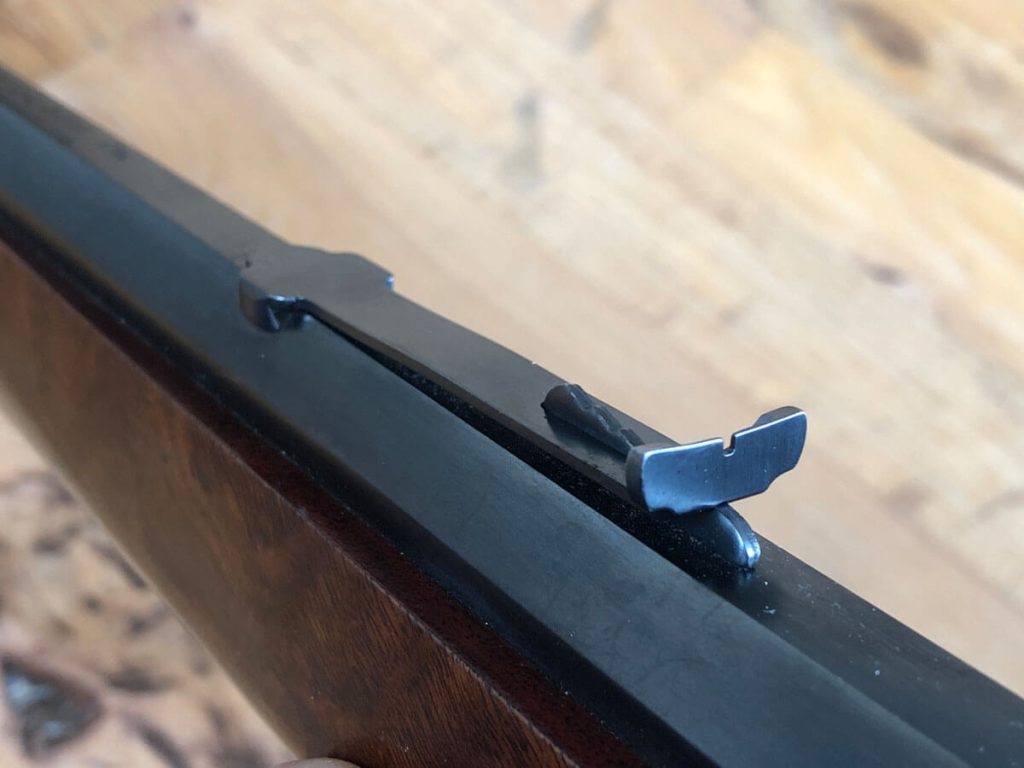
I hung a bison vital-sized steel target against a little mesa, and Dan exercised the Winchester at 50-yard intervals. The traditional rear sight sports an adjustable ramp, and Dan was able to use it to make consistently good groups out to 350 yards. The rifle bellows with authority and kicks with enthusiasm when loaded with high-performance loads, but the shotgun-style buttplate rendered recoil tolerable, if not entirely comfortable.
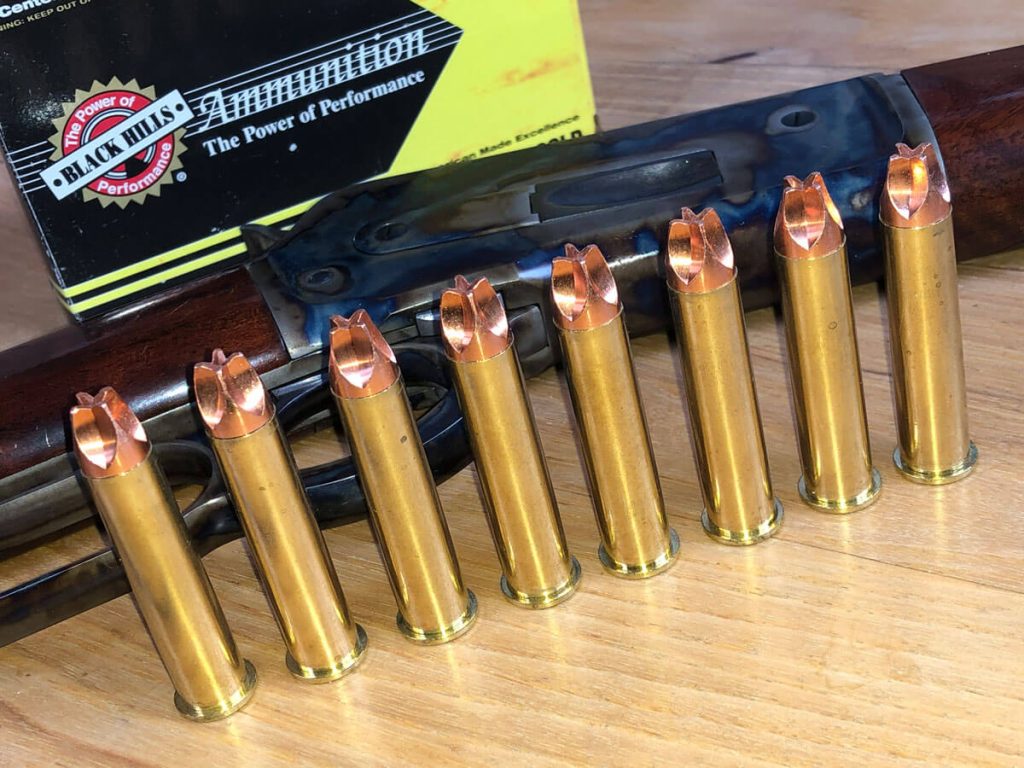
Capacity on the Turnbull Winchester 1886 is eight plus one. The action is very strong and fast but must be worked with authority. In the hands of a good lever-gun man, the rifle is capable of sending a massive amount of lead downrange in very short order. The trigger in Dan’s rifle is quite fair by lever-action standards, breaking at an average of 5 pounds 2.5 ounces. The overall weight of the rifle comes in right at 9 pounds 5.5 ounces.
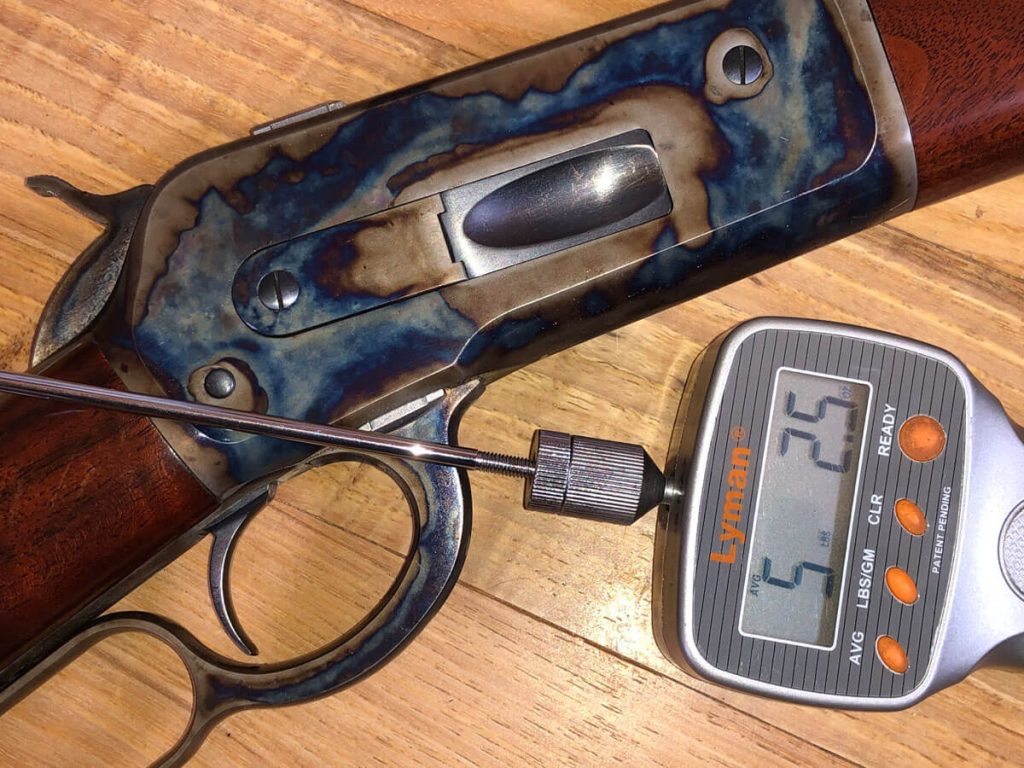
CONCLUSION
The Turnbull Winchester 1886 rifle we tested is a spectacular firearm. The color casehardening, in particular, is extraordinary. We had zero malfunctions, the rifle shot well, and carried nicely in the hand and in a saddle scabbard. Accuracy was good.
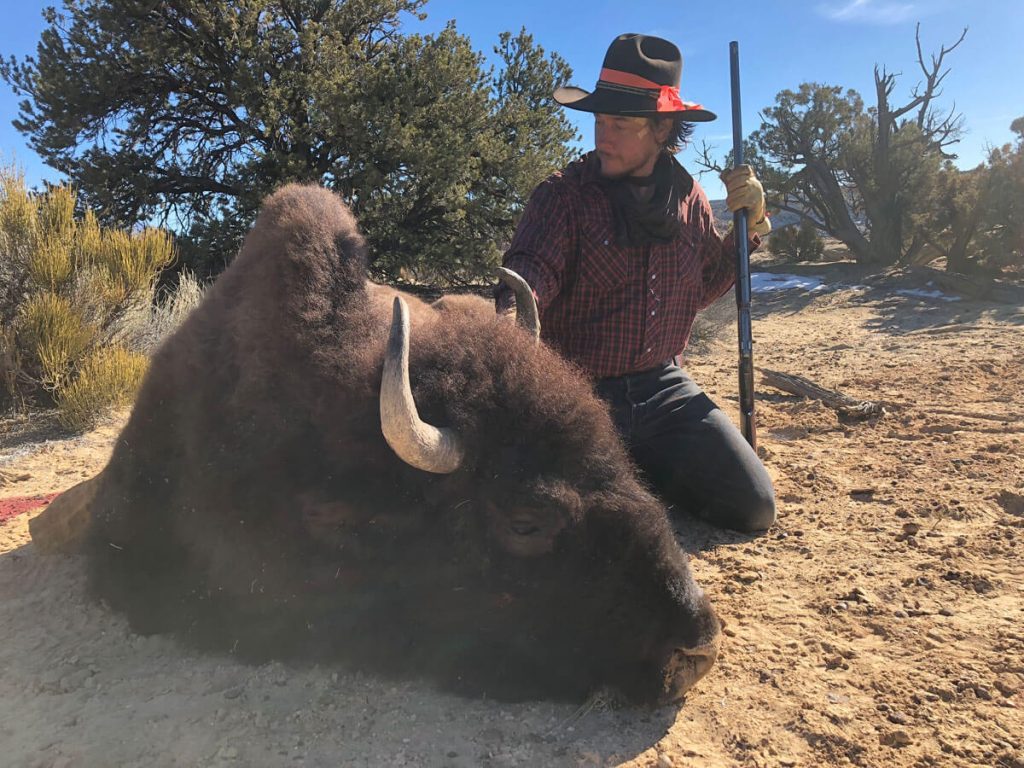
We stepped off our horses and tied them when the bison tracks grew hot. Following carefully, Dan spotted a horn flashing in the sun amongst a hilltop copse of Junipers. A circuitous stalk put us within range, but the buffalo were still out of sight in the thick desert timber. Then the breeze stroked us across the back of our necks, and the herd erupted in a wave of pounding hooves. When they paused 175 yards distant Dan placed a HoneyBadger bullet through a big cow. She had started to move just as his trigger broke, and she departed in the shadow of the herd’s dust. Following, we jumped the cow and Daniel finished her. The Black Hills bullets performed admirably, each one passing completely through the bison.
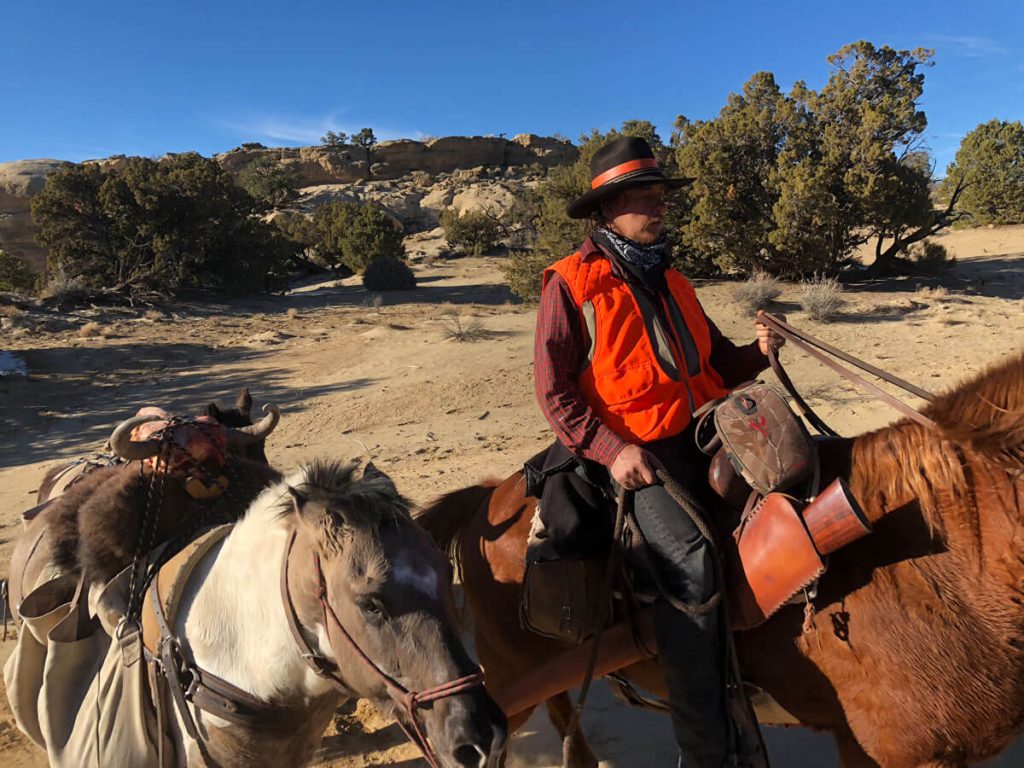
We processed the buffalo, loaded the meat onto our horses, and slid the long Turnbull rifle into its saddle scabbard. Swinging into our saddles, we pointed our horses toward the trailhead, eight miles distant. It had been a great hunt, with a great rifle, for one of America’s most iconic animals.
